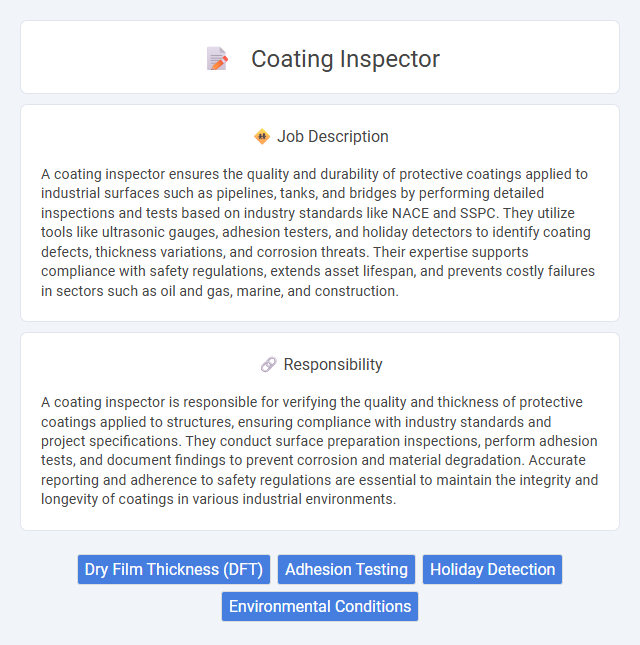
A coating inspector ensures the quality and durability of protective coatings applied to industrial surfaces such as pipelines, tanks, and bridges by performing detailed inspections and tests based on industry standards like NACE and SSPC. They utilize tools like ultrasonic gauges, adhesion testers, and holiday detectors to identify coating defects, thickness variations, and corrosion threats. Their expertise supports compliance with safety regulations, extends asset lifespan, and prevents costly failures in sectors such as oil and gas, marine, and construction.
Individuals with strong attention to detail and good visual acuity are likely suitable for a coating inspector job, as it involves inspecting surfaces for imperfections and coating quality. Those comfortable working in various environmental conditions and handling repetitive tasks may have a higher probability of success in this role. Candidates with physical stamina and the ability to follow safety protocols are often more appropriate for this position, given the nature of on-site inspections.
Qualification
A coating inspector must possess a strong understanding of coating application techniques, material specifications, and industry standards such as NACE and SSPC. Certifications like NACE Coating Inspector Program (CIP) Level 1 or 2 and API 653 are highly valued for validating technical expertise and ensuring compliance with safety and quality regulations. Proficiency in using inspection tools, interpreting technical drawings, and conducting surface preparation assessments is essential for accurate quality control and defect identification.
Responsibility
A coating inspector is responsible for verifying the quality and thickness of protective coatings applied to structures, ensuring compliance with industry standards and project specifications. They conduct surface preparation inspections, perform adhesion tests, and document findings to prevent corrosion and material degradation. Accurate reporting and adherence to safety regulations are essential to maintain the integrity and longevity of coatings in various industrial environments.
Benefit
A coating inspector likely enhances project quality assurance by identifying surface defects and ensuring proper application, which may reduce costly rework. They probably contribute to increased durability and corrosion resistance of materials, extending asset lifespan and lowering maintenance expenses. Their role might improve safety compliance and environmental standards, potentially minimizing operational risks and regulatory penalties.
Challenge
The role of a coating inspector likely involves navigating complex and demanding environments to ensure surface protection standards are met. Challenges probably stem from the need to identify subtle defects and inconsistencies that could affect durability and safety. Balancing precision with time constraints may also be a significant aspect of the job's difficulty.
Career Advancement
Coating inspectors specialize in assessing protective coatings on industrial structures, ensuring corrosion prevention and compliance with safety standards to prolong asset lifespans. Career advancement opportunities include progressing to senior inspector roles, quality assurance management, or specializing in advanced non-destructive testing techniques. Acquiring certifications such as NACE CIP Level 2 or SSPC C1-C5 significantly enhances job prospects and potential salary growth within the corrosion control industry.
Key Terms
Dry Film Thickness (DFT)
A Coating Inspector specializing in Dry Film Thickness (DFT) ensures that protective coatings meet specified thickness standards to guarantee durability and corrosion resistance. Utilizing advanced gauge instruments, they perform precise measurements on various substrates, documenting results to comply with industry regulations such as SSPC and NACE standards. Their expertise is critical in quality control processes for infrastructure, pipelines, and marine applications where coating integrity directly impacts asset longevity.
Adhesion Testing
Coating inspectors specializing in adhesion testing evaluate the bond strength between coating layers and substrate materials to ensure optimal durability and performance. They utilize standard testing methods such as pull-off tests, cross-hatch adhesion, and tape tests to identify potential coating failures. Accurate assessment of adhesion helps prevent corrosion, enhances coating lifespan, and meets industry standards like ASTM D4541.
Holiday Detection
Coating inspectors specializing in holiday detection utilize advanced holiday detectors and high-voltage equipment to identify pinholes and discontinuities in protective coatings on pipelines, tanks, and industrial structures. Accurate holiday detection prevents corrosion by ensuring coating integrity, significantly extending asset lifespan and reducing maintenance costs. Proficiency in interpreting test results and adhering to industry standards such as NACE SP0188 is critical for effective holiday inspection and quality assurance.
Environmental Conditions
Coating inspectors assess environmental conditions such as temperature, humidity, and surface cleanliness to ensure optimal coating application and adherence to industry standards. They monitor weather factors and contaminants that could affect coating performance, preventing defects like corrosion or peeling. Accurate environmental evaluation supports compliance with safety regulations and extends the lifespan of coated structures.
 kuljobs.com
kuljobs.com